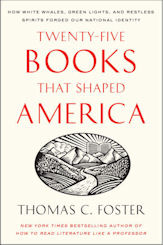UM-Flint Professor Picks the Books that Shaped America

UM-Flint Professor of English Thomas C. Foster, author of the New York Times bestselling How to Read Literature Like a Professor (more than 600,000 copies in print), has a new book TWENTY-FIVE BOOKS THAT SHAPED AMERICA. The HarperCollins press release calls it a highly entertaining and informative new book on the 25 works of literature that have most shaped American identity.
Besides How to Read Literature Like a Professor, Foster's other successful book is How to Read Novels Like a Professor, but this time he says his goal was a title that did not contain the words, "like a professor."
 "We hit on this one (TWENTY-FIVE BOOKS THAT SHAPED AMERICA), then debated "shaped"—the final selection—versus "changed," which has very different connotations," recalled Foster. "I wanted to talk about the myth of America, the national story as it has evolved over time and in the hands of a wide array of writers. But of course one can never deal with all the writers worthy of discussion, so my goal has been to introduce some exemplary works and hope that encourages readers to go beyond what I've done and bring other books into the conversation. I don't mean my list to be final and do expect every reader to object to one or two inclusions and, more vehemently, exclusions." Foster has established himself as the go-to literature expert for many American readers, having opened countless minds to the finer points of reading and analyzing beloved books. In TWENTY-FIVE BOOKS THAT SHAPED AMERICA, he applies that combination of know-how and analysis to great works of American literature and explains how each of them has shaped our very existence as readers, students, teachers, and Americans.
"We hit on this one (TWENTY-FIVE BOOKS THAT SHAPED AMERICA), then debated "shaped"—the final selection—versus "changed," which has very different connotations," recalled Foster. "I wanted to talk about the myth of America, the national story as it has evolved over time and in the hands of a wide array of writers. But of course one can never deal with all the writers worthy of discussion, so my goal has been to introduce some exemplary works and hope that encourages readers to go beyond what I've done and bring other books into the conversation. I don't mean my list to be final and do expect every reader to object to one or two inclusions and, more vehemently, exclusions." Foster has established himself as the go-to literature expert for many American readers, having opened countless minds to the finer points of reading and analyzing beloved books. In TWENTY-FIVE BOOKS THAT SHAPED AMERICA, he applies that combination of know-how and analysis to great works of American literature and explains how each of them has shaped our very existence as readers, students, teachers, and Americans.
Foster is hoping that after reading his latest book that readers will take action. "My other hope is that it drives readers to—or back to—the books on the list. I was surprised to find out how much one or two of them had improved since I first read them, as well as how others had taken on new or different meanings for me. We all think we know The Scarlet Letter, but I don't think it's true unless we've paid it a visit lately. And Moby Dick turns out to be really funny. Who knew? Not me, almost 40 years ago."
Foster admits that getting the list down to 25 was not an easy task. "At various times, I probably had 50 or 60 books in play, some of them more seriously than others, before I got down to 25 plus the 15 I mention in the conclusion. Doing 100 Books that Shaped America would be easy; the hard part was culling down to the final list, since something important gets left out of the discussion with each dropped book."
Foster has already been asked to select the "best" of the 25. "Let me offer two nineteenth-century works without which twentieth-century American writing couldn't possibly look as it does (or did): Walt Whitman's Leaves of Grass and Mark Twain's Adventures of Huckleberry Finn. I use the dating system BW and AW in the book for Before Walt and After Walt; Americans, poets especially but really writers of any genre, can't write as they did before once Whitman arrives on the scene. And Twain is the American Dante—no hell or purgatory here, but like Dante he gives us permission to write in the vernacular, the real language of the people rather than of some literary elite. Without their examples, we probably don't have Hemingway and Faulkner or Ginsberg and Kerouac, certainly not as we have them now. Nor, for that matter, Dylan and Springsteen."
(Harper Paperbacks; Trade Paperback Original; On Sale: May 24, 2011; $14.99)
Related Posts
No related photos.
UM-Flint News
The Office of Marketing & Communications can be reached at mac-flint@umich.edu.